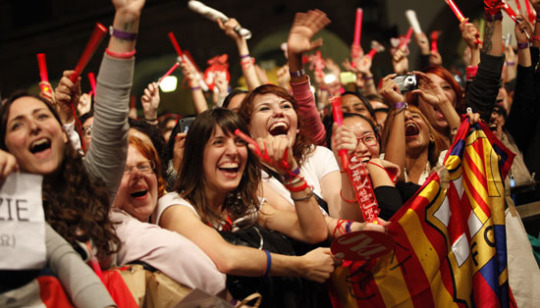
Recently, Billboard, a world famous music chart, made a K-pop chart category. It means K-pop is spreading beyond Asia to Europe and South America judging from “SM Town in Paris” in June, the JYJ concert in Spain in October, and the forthcoming Cube Entertainment’s London concert in December. Fans of K-pop are waiting to see Korean singers. They have even made K-pop fan clubs with friends, singing and dancing to K-pop songs. Through this article, we look into the whole story of K-pop fever and find its economic effects.
Most people think that the beginning of K-pop fever was Japan. However, it was actually in China. K-pop fever in China started with Korean dramas. The Korean drama The Star in My Heart, which was broadcast on MBC, started to become popular in China. At the same time, HOT, which was an idol group, was performing in China. It also helped K-pop’s popularity. The Korean Wave or Hallyu was made at that time. Then, several years later, Winter Sonata was very popular in Japan. Many people became interested in Korean culture.
Now, the centre of attention of Korean culture is K-pop. According to Nitkei Entertainment, a monthly magazine in Japan, K-pop singers have remarkable skills acquired by intensive training. On August 27, the music program Music Bank on KBS 2 TV was broadcast overseas to 54 countries. It had many viewers all over the world and introduced K-pop.
K-pop fever gave birth to another fever, so-called “K-pop cover dance,” where K-pop fans imitate the singing or dancing of their favorite artists. On social network services (SNS) and Websites like YouTube, K-pop cover dance is a spreading phenomenon. There are many cover groups. For example, a music video was made by European girls who recorded their own voices on a Girl’s Generation music video. MBC is broadcasting the program Cover Dance Festival K-POP Road Show 40120, dealing with K-pop cover dance contests in Europe, Asia, and North and South America. The production crew and some K-pop stars went to Moscow, Sao Paulo, Tokyo, Madrid, and LA, and evaluated the preliminary rounds.
What is the secret of the success of K-pop? First, K-pop has developed a systematic management system to produce singers. Potential stars go through years of training and coaching, helping to produce accomplished performers with appealing appearances and personalities. Second, it is easy to sing along to the lyrics with their repetitive elements. Also, K-pop songs are written not only by Korean songwriters but also by songwriters from other countries, potentially increasing their appeal in these countries. In addition, many foreigners can see the performances and the music videos of Korean singers on the Internet and various social networks.
K-pop’s economic effect is amazing in Korea. In 2008, according to the Ministry of Culture, Sports and Tourism and the Korea Foundation for International Culture Exchange, the total revenue of K-pop was 4.9 trillion won, with a further 1.7 trillion won generated indirectly through product endorsements. This is as much as exporting 240,000 cars abroad. Also, it brings positive knock-on effects. For example, people who are fascinated with K-pop are interested in Korean culture and visiting Korea. Then, tourism revenue and foreign currency can increase. In addition, it raises the national image, and brings foreigners closer to Korea.
In the Conference on Promoting the Korean Contents Industry on June 22, the Minister of Culture, Sports and Tourism Jeong Byung-guk said, “As K-pop fever spreads, the spending of visitors is greatly increasing. The budget is allotted to industry, but enough isn’t allotted to the culture industry.” Then he apologized for the lack of budget for the culture industry, and said not only the government but also corporations should support the culture industry like K-pop.
If the government and corporations help to allot a budget, K-pop will be more powerful and affect more people in different countries. I am looking forward to listening to K-pop anywhere in the world.








